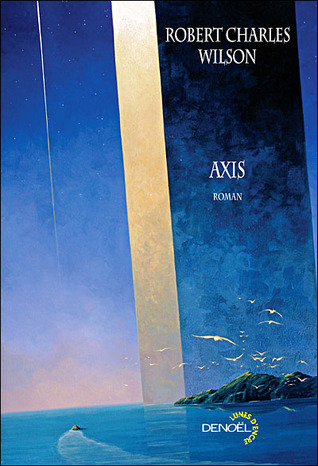Not as good as the excellent Spin, but a fairly good sequel. A few complaints:
* Diane doesn't show up until almost page 70; Tyler isn't in Axis at all (although Jason is, sort of, at the end!). Since they -- especially Tyler -- were the POV characters of Spin, this was both disappointing and disconcerting.
* This was touted as the answer to who/what the Hypotheticals really were, and the reason behind the Spin. The characters imply and/or state this repeatedly, and it was implied by at least some of the official or semi-official summaries of the book. But really, at the end of the book, we still have at least as many questions about the Hypotheticals as we did at the beginning. Which may be the point, in a way, but is nonetheless frustrating and confusing. Even the few answers we've found don't make much sense. (I just found out this is meant to be a trilogy, so this is probably simply symptomatic of middle-book-itis. :P )
* Since Spin took repeated potshots at Christian fanatics, it seems Wilson decided Axis should give other religious fanatics their turn in the crosshairs. He mentions in passing that Muslim extremists irrationally loathe the idea of Fourths (why is not explained), and then we have the late husband of Rebka and father of Isaac. I believe his name is given once, in passing, but for the most part he is deliberately nameless. Rebka tells us that because he was a devout orthodox Jew, he refused the Fourth treatment, even though it could have saved him from dying from an aneurysm. As a devout orthodox Jew, I call BS. Exactly how Jewish Law (halacha) would view a theoretical and not well-explained medical treatment is purely speculative, of course. However, while I could see it being forbidden for a healthy individual to take the risk merely for the heck of it, I can see NO reason why it would be forbidden as a life-saving measure; it might even be required in some cases, were it a viable option. (The legal issues add another kink to the equation, but in cases of life and death, would not be sufficient to forbid it.) And if this nameless husband were so devout, why did he marry a woman who is clearly not? A woman who planned to abort her own child, not for reasons of health but simply because the child was an inconvenience?
* Names! Why, oh why, is she named Rebka? Pick the English version of the name: Rebekah, Rebecca, or another spelling; or the Hebrew: Rivka, Rivkah, Rifkah. The spelling Rebka is Czech or Polish, and completely out of place among a group of academics associated with the American University! And why is her child Isaac? Biblically, Isaac was Rebecca's husband, not her child. If we're going for the symbolism of the sacrificial child (and given that Divali's name is Avram, I must assume we are), why name her Rebecca? Call her Sarah! Or give her a name not associated with Isaac at all. Call her Hannah, mother of another child given to God.
* Lise, Brian, and Turk: Unlike the main characters in Spin, this time the main characters are just interesting enough to get my attention . . . and then never really made three-dimensional. Wilson can do better than this -- why didn't he?
* What is with the little metal tangs on the first page of each section? I mean, they're obviously compass pointers. But why are some gold and some copper? What does their position on the page indicate? And why bother with them at all?
All this aside, every reader of Spin will want to read Axis. And then, apparently, bide their time waiting for the forthcoming Vortex. (Why do I keep getting sucked into unfinished trilogies without knowing that's what they are?)

